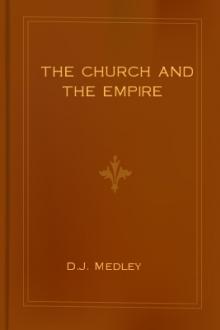Genre History. Page - 4
All entire books of the History genre on your device.

ct dualism in theorganisation of society and, therefore, of the theoretical equalitybetween the ecclesiastical and the secular organs of government.According to this doctrine Sacerdotium and Imperium are independentspheres, each wielding the one of the two swords appropriate toitself, and thus the Emperor no less than the Pope is VicariusDei. It is this doctrine behind which the champions of the Empireentrench themselves in their contest with the Papacy. It was assertedby the Emperors

she said, and withdrew her hands from his shoulders. The faces of both were now gazing straight on over the gold-flecked slope before them. "Go on, you are a man. I know you will not turn back from what you undertake. You will not change, you will not turn--because you cannot. You were born to earn and not to own; to find, but not to possess. But as you have lived, so you will die.""You give me no long shrift, mother?" said the youth, with a twinkle in his eye. "How can

f the ice was carrying him daily back, almost as much as they were able to make in the day's work. Retreat was therefore begun.Parry's accomplishments, marking a new era in polar explorations, created a tremendous sensation. Knighthood was immediately bestowed upon him by the King, while the British people heaped upon him all the honors and applause with which they have invariably crowned every explorer returning from the north with even a measure of success. In originality of plan and

perityand safety of the inhabitants, at once by the profuseness ofembellishment in those newly erected, and by the neglect of thejealous precautions required in former days of confusion andmisrule. Thus it was with the village of Lynwood, where, amongthe cottages and farm-houses occupying a fertile valley inSomersetshire, arose the ancient Keep, built of gray stone,and strongly fortified; but the defences were kept up ratheras appendages of the owner's rank, than as requisite for hisprotection;

lems that have interested thoughtful men, shows how some of these have been solved, and points the way to the solution of others. It studies educational systems, selecting the good, and rejecting the bad, and introducing the student directly to the pedagogical questions that have influenced the world. For these reasons, the study of education should begin with its history.Karl Schmidt says: "The history of the world is the history of the development of the human soul. The manner of this

ed they are in a thorny shell. The Mexican Indians gather them and peel them and sell them to travelers for six cents a dozen. It is called "tuna," and is considered very healthy. It has a very cool and pleasing taste.From this century-plant, or cacti, the Mexicans make their beer, which they call pulque (pronounced polke). It is also used by the natives to fence in their mud houses, and forms a most picturesque and impassable surrounding. The Indians seem cleanly enough, despite all

nclusions beforehand into the acceptable and the inacceptable, the edifying and the shocking, the noble and the base. Wonder has no longer been the root of philosophy, but sometimes impatience at having been cheated and sometimes fear of being undeceived. The marvel of existence, in which the luminous and the opaque are so romantically mingled, no longer lay like a sea open to intellectual adventure, tempting the mind to conceive some bold and curious system of the universe on the analogy of

d bolder Europeans; and they moved westward, norcould have helped that had they tried. They lived largely andblithely, and died handsomely, those old Elizabethan adventurers,and they lie today in thousands of unrecorded graves upon twocontinents, each having found out that any place is good enoughfor a man to die upon, provided that he be a man.The American frontier was Elizabethan in its quality--childlike,simple, and savage. It has not entirely passed; for bothElizabethan folk and Elizabethan

ewitnessing something very like the suicide of civilizationitself. There are people in both camps who believe thatarmed and economic conflict between revolutionary andnon-revolutionary Europe, or if you like between Capitalismand Communism, is inevitable. These people, in both camps,are doing their best to make it inevitable. Sturdy pessimists,in Moscow no less than in London and Paris, they go so faras to say "the sooner the better," and by all means in theirpower try to precipitate

s his confidence in the English critics being less unreasonable in their demands; and that their indulgences will be proportioned to the difficulties that occurred in collecting accurate information. With this reliance, the descriptions, observations, and comparisons, such as they are, he presents to the public, candidly acknowledging that he is actuated rather by the hope of meeting its forbearance, than by the confidence of deserving its approbation.[1] Monsieur (I beg his pardon) Citoyen